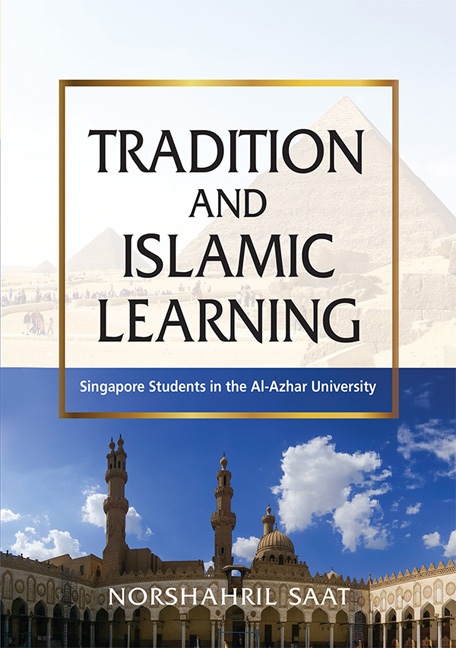Book contents
- Frontmatter
- Dedication
- Contents
- Preface
- Acknowledgements
- Abbreviations
- A Note on Translation, Spelling and Other Conventions
- Chapter 1 Introduction: Islamic Education and Religious Authority
- Chapter 2 The Al-Azhar University: A Historical Sketch
- Chapter 3 Prominent Southeast Asian Al-Azhar Graduates
- Chapter 4 Al-Azhar Today: The Experience of Singapore Students
- Chapter 5 Conclusion
- Bibliography
- Index
- About the Author
- Frontmatter
- Dedication
- Contents
- Preface
- Acknowledgements
- Abbreviations
- A Note on Translation, Spelling and Other Conventions
- Chapter 1 Introduction: Islamic Education and Religious Authority
- Chapter 2 The Al-Azhar University: A Historical Sketch
- Chapter 3 Prominent Southeast Asian Al-Azhar Graduates
- Chapter 4 Al-Azhar Today: The Experience of Singapore Students
- Chapter 5 Conclusion
- Bibliography
- Index
- About the Author
Summary
Initially, it wasn't my personal choice [to study at Al-Azhar]. I wanted to go to a polytechnic, but my parents wanted me to go to the Al-Azhar University and pursue the ukhrawi (religious) field. They wanted this for me since I was in Primary 1.
Fazlurrahman Sidek, a Singaporean studying at the Al-Azhar UniversityIn May 2017, an online British Broadcasting Corporation (BBC) current affairs programme, Heart and Soul, scrutinized the Al-Azhar University's effectiveness in combating Islamic extremism and radicalism. The episode, entitled The Battle for Al-Azhar, questioned whether the mode of learning promoted by the university remains relevant in this modern day and age, especially when some scholars had described its curriculum to be antiquated and unreformed.1 They also asked if the university is doing enough to counter radical ideas promoted by groups such as the Islamic State in Iraq and Syria (ISIS) and Al-Qaeda, given that individuals sympathetic to their struggle also referred to the classical texts taught by the university's professors. Some analysts posited that in tackling violence, Al-Azhar is the problem and not the solution.
Yet, the millennium-old Egyptian university remains the most popular destination for Singapore madrasah (Islamic religious schools) students seeking a degree in Islamic studies. Many Singapore Malay-Muslim parents consider the Al-Azhar as the centre of “moderate” Islam. The university is the standard bearer of Sunni Islam, and it teaches the Shafie School of jurisprudence, one of the four Sunni school of jurisprudence that Muslims in the Malay world generally adhere to. In fact, Al-Azhar remains the top choice for Southeast Asian Islamic studies students, even though there are other centres of Islamic learning offering better scholarships, such as the universities in Saudi Arabia, Jordan and Kuwait.
The Al-Azhar University is arguably the first university in the world, and it has been the centre of Islamic learning for centuries. Established in the tenth century, Al-Azhar is one of the earliest in the world to issue degrees to its students. Al-Azhar did shape the religious discourse not only in Arabia but also in Southeast Asia. For example, in the early twentieth century, returning students from Cairo brought back reform ideas to Singapore, which was then already a cosmopolitan British town. These returnees inspired the progressive movement in the Malay world, referred to as the Kaum Muda (young camp).
- Type
- Chapter
- Information
- Tradition and Islamic LearningSingapore Students in the Al-Azhar University, pp. ix - xivPublisher: ISEAS–Yusof Ishak InstitutePrint publication year: 2018

